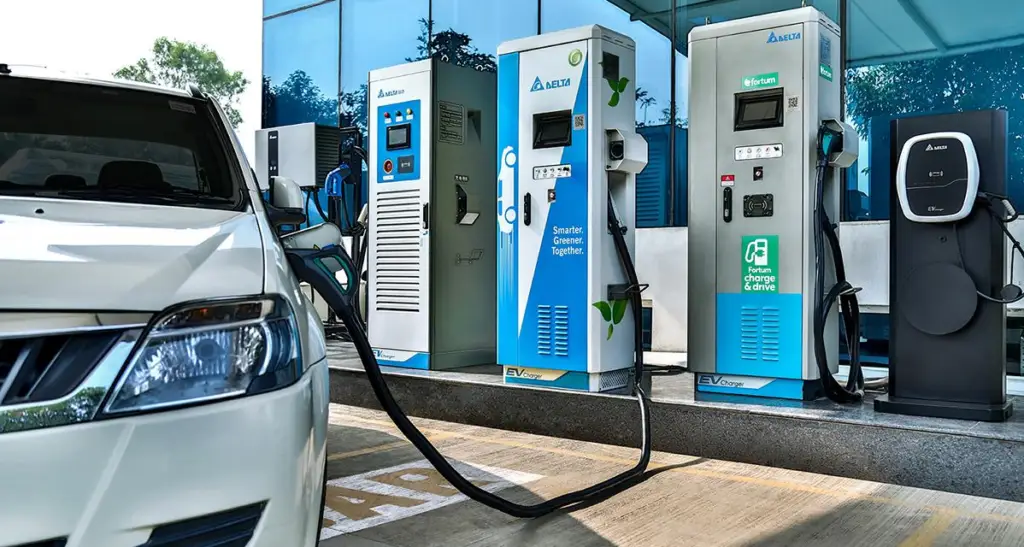Table of Contents
ToggleEV Charging Stations: Thrilling Insights into 2024 Revolutionizing India's Electric Mobility

Introduction: EV Charging Stations
Dear fellow citizens and enthusiasts of electric mobility in India, welcome to a comprehensive exploration of the rapidly evolving landscape of EV charging stations across our nation. As an ardent advocate for sustainable transportation and an experienced EV owner, I, Varun Sharma, am excited to delve into the intricacies of India’s electric vehicle charging infrastructure in 2024. Join me on this journey as we navigate through the present state, challenges, opportunities, and future prospects of EV charging stations, tailored specifically for the Indian audience.
The Urgency for EV Charging Stations in India:
India’s ambitious targets for reducing carbon emissions and promoting sustainable transportation have propelled the rapid adoption of electric vehicles nationwide. With the government’s commitment to electrifying a significant portion of the automotive fleet by 2030, the demand for a robust and widespread network of EV charging stations has never been more pronounced.
In 2024, as the Indian EV market continues to expand, fueled by technological advancements and supportive policies, the need for accessible and reliable charging infrastructure has become paramount. As a proud EV owner, I understand the importance of addressing range anxiety and ensuring seamless charging experiences to accelerate the transition towards electric mobility.
Exploring the Landscape of EV Charging Stations in India:

Tata Power
As a leading player in the energy sector, Tata Power has made significant strides in establishing a robust network of EV charging stations. Leveraging its expertise in renewable energy and electrical infrastructure, Tata Power aims to provide convenient and accessible charging solutions to EV owners in both urban and rural areas.
Through strategic partnerships and collaborations with government agencies, Tata Power has deployed charging stations in key cities, along highways, and at prominent commercial hubs. Their commitment to expanding the charging infrastructure aligns with India’s vision for sustainable transportation.
Bharat Heavy Electricals Limited (BHEL):
BHEL, a stalwart in the power sector, has diversified its portfolio to include EV charging infrastructure solutions. With a focus on indigenous development and innovation, BHEL aims to address the unique challenges of India’s electric mobility transition.
Collaborating with state governments and local authorities, BHEL has rolled out charging stations in urban centers, industrial clusters, and public spaces. Their emphasis on reliability and efficiency underscores their contribution to the electrification drive.
Fortum India:
Fortum India, a subsidiary of the Finnish energy company, has emerged as a key player in India’s EV charging ecosystem. Leveraging its global expertise in fast-charging technology, Fortum aims to reduce charging times and enhance the convenience of EV ownership for Indian consumers.
With a focus on interoperability and user experience, Fortum has strategically positioned its charging stations in high-traffic areas, including shopping malls, commercial complexes, and public transportation hubs. Their commitment to sustainability and innovation resonates with India’s aspirations for a cleaner and greener future.
ChargePoint:
ChargePoint, a global leader in EV charging solutions, has made significant inroads into the Indian market by partnering with local stakeholders and infrastructure providers. Offering a comprehensive suite of charging solutions, including level 2 and DC fast chargers, ChargePoint aims to cater to the diverse needs of EV owners.
Through their interoperable network and user-friendly mobile app, ChargePoint ensures seamless access to charging infrastructure across India. Their focus on reliability, affordability, and scalability positions them as a trusted partner in India’s electric mobility revolution.
Challenges and Opportunities:
While the proliferation of EV charging stations in India is promising, several challenges persist, hindering the widespread adoption of electric vehicles:
Range Anxiety: The limited availability of charging stations, particularly in rural and remote areas, exacerbates range anxiety among EV owners, deterring potential buyers from making the switch to electric mobility.
Infrastructure Development: Establishing charging stations requires substantial investment in land, equipment, and grid integration, posing financial and logistical challenges for stakeholders.
Grid Capacity and Stability: Integrating EV charging infrastructure with the existing power grid necessitates upgrades to enhance capacity and stability, ensuring uninterrupted charging services and mitigating strain on the electricity network.
Regulatory Framework: Clear and consistent regulatory policies are essential to incentivize investment in EV charging infrastructure and promote interoperability among different charging networks.
Despite these challenges, the evolving regulatory landscape and concerted efforts by industry players offer promising opportunities for the expansion of EV charging infrastructure in India:
Integration of Renewable Energy: Leveraging renewable energy sources such as solar and wind power can enhance the sustainability of EV charging stations while reducing reliance on conventional grid electricity.
Advancements in Battery Technology: Breakthroughs in battery technology, including faster charging and higher energy density, can improve the efficiency and convenience of EV charging, driving greater adoption among consumers.
Innovative Business Models: Collaborative partnerships between public and private entities, along with innovative business models such as battery swapping and shared charging infrastructure, can address the financial viability of EV charging stations and enhance accessibility for consumers.
Conclusion:
As India embarks on its journey towards sustainable transportation, the proliferation of EV charging stations plays a pivotal role in shaping the future of mobility. From enhancing accessibility to addressing range anxiety, charging infrastructure is essential for accelerating the adoption of electric vehicles and achieving our environmental goals.
As an EV owner and advocate, I am optimistic about the trajectory of India’s electric mobility revolution. With continued collaboration between policymakers, industry stakeholders, and consumers, we can overcome challenges and realize the full potential of electric vehicles in India.
Let us seize this opportunity to drive positive change and pave the way for a cleaner, greener future for generations to come.
External Links:
Ministry of Power, Government of India – Electric Vehicle Charging Guidelines
Society of Indian Automobile Manufacturers (SIAM) – Electric Vehicle Charging Infrastructure
NITI Aayog – National Mission on Transformative Mobility and Battery Storage
Energy Efficiency Services Limited (EESL) – EV Charging Stations
Together, let us drive towards a brighter and more sustainable future, powered by electric mobility!
Charging times vary based on the charger type and the vehicle’s battery capacity. Fast chargers can charge a vehicle to 80% in approximately 30 minutes, while regular chargers may take several hours for a full charge.
Most charging stations support standard connectors like Type 2 (AC) and CCS (DC), which are compatible with a wide range of electric car models. However, it’s essential to check compatibility before using a specific charging station.
As of 2024, India has witnessed significant growth in electric vehicle charging infrastructure, with thousands of charging stations deployed across the country by both public and private entities.
Many electric vehicle owners prefer to charge their vehicles at home using a dedicated charging station or a standard power outlet. However, public charging stations are essential for long trips or when home charging is not available.
Some charging stations utilize renewable energy sources such as solar or wind power to charge electric vehicles, contributing to a cleaner and more sustainable charging infrastructure. However, not all charging stations are powered by renewable energy.


